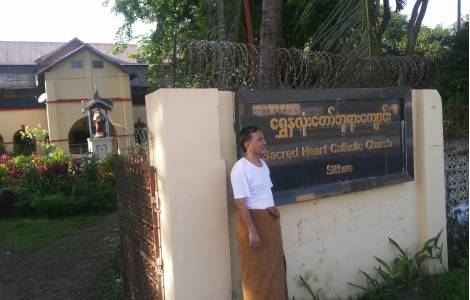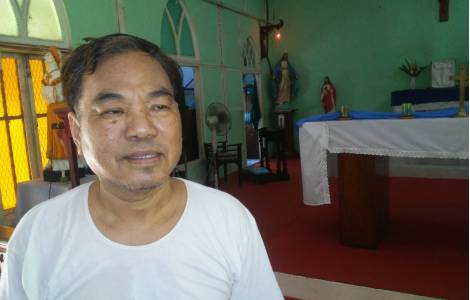
Sittwe (Agenzia Fides) - "There are five Catholic priests stranded in the Paletwa area in Chin state. The area is practically sealed off and it is a problem to reach them, as well as the inhabitants of the villages which are in the grip of the conflict". In the Church of the Sacred Heart of Sittwe, in the Burmese state of Rakhine (in western Myanmar), Father Michael Kyi Lwin is worried, but does not lose hope and continues to express words of encouragement and hope.
Hope is severely put to the test by a contingency, that of civil conflict, aggravated by Covid-19: "But next Sunday - he announces to Agenzia Fides, while showing the church where he lives, which is more than 150 years old - we will be able to celebrate mass publicly ago. It is the first time in 4 months".
The restrictions of the Coronavirus have added to those of a daily armed conflict, and carrying out service in 18 villages is not easy: "In normal times, I reach communities every Sunday to attend mass. We have 180 families who join the 35 residents of Sittwe, but the conflict makes everything more difficult". Sittwe is the capital of Rakhine State, where since January 2019 the war has intensified between the Burmese army and the Arakan Army, an autonomist organization placed by the Burmese government on the list of terrorist groups and excluded from both the national truce and the tiring peace process with the various armed factions, which have been fighting against the central government for decades.
It is a drama that adds to another drama: in 2012 tensions between the Buddhist majority of Sittwe and the Rohingya Muslim minority exploded in a wave of anti-Muslim violence, fomented by radical extremist groups such as the well-known "969" organization of the Wirathu monk from which the Buddhist Sangha distanced himself, condemning his poisonous sermons. A massacre and the expulsion of Muslim families from the city took place: 280 dead, about 135 thousand displaced and the destruction of over 10 thousand homes, according to NGOs.
Today Ambala, the Muslim area of Sittwe, is a ghetto for a few families who live in precarious conditions. The rest were "evacuated" eight kilometers further north or in the IDP camps surrounding Sittwe where access has been made difficult for the humanitarian organizations themselves, both of the UN and the NGO world. "Muslims cannot move from where they are - adds Fr. Michael - and it is also difficult for us to help", as it is difficult to help those who live in the Paletwa area, on the border between Chin State and the Rakhine State.
"Many of our students come from Chin State - explains the parish priest of the Sacred Heart parish which hosts 50 to 100 students who have come to attend university - and when they want to go home they can only go as far as Kyauktaw, 60 miles from Sittwe ; then they have to walk another 40 miles on foot". The few roads are too dangerous. "War is a daily reality also in other areas of Rakhine. I am thinking - concludes Fr. Michael - of the areas of Myay Bon and Min Bya, where there are two parishes with 500 and 400 families to assist. Fortunately there are two priests but fighting takes place every day. " The paradox is that, 350 kilometers further south, you go on vacation to the peaceful resorts of Ngpali, among the most beautiful beaches in Rakhine and perhaps in the whole of Myanmar.
Father Michael is not alone: there are three sisters of the Congregation of the Daughters of Our Lady of the Missions (Our Lady of the Missions, also known by their French name Religieuses de Notre Dame des Missions because it all began in France, in Lyon, in 1861 thanks to Adèle Euphrasie Barbier). They manage the reception of 35 girls in the structure next to the church. They are Chin ethnic girls because the peculiarity of the Rakhine state - whose reference diocese is that of Pyay, ecclesiastical province of Yangon - is that practically all the Catholics of the State are of Chin origin. Father Michael is from Pyay and has been here for three years. Sittwe an important center of reference in this part of Myanmar and even the priests of Paletwa used to come here for spiritual retreat. "We are contacting the army to try to get them at least food and medicine. Caritas da Pyay (the Catholic diocese that embraces the entire territory of the Rakhine State) is also moving". But it is an uphill road and this part of the Country remains a place of immense pain. Right in front of the Sacred Heart church is the prison of Sittwe. Most of the prisoners are Muslim.
Before the war with the Arakan Army (born in 2009, active since 2015 and reappeared vigorously a year and a half ago) and after the pogroms of 2012, Rakhine also witnessed the forced expulsion in 2017 of over 700 thousand ethnic Muslim Rohingyas who found refuge in Bangladesh. Of the original population, perhaps 300 thousand people remained, isolated or ghettoized in the refugee camps scattered throughout the territory. The great mosque of Sittwe, a masterpiece of nineteenth-century Islamic art, is now an abandoned place with a devastated interior and an exterior attacked by plants and bad weather. It is controlled by the military and it is forbidden to approach it, as happens to those who try to enter the nearby district of Ambala. Yet Sittwe is surrounded by fine sandy beaches overlooking the Gulf of Bengal and a handful of kilometers from here, in Mrauk U, there is one of the most important archaeological sites in all of Southeast Asia, which could easily become a UNESCO heritage site. But everything is compromised by war, by intolerance, and also, as some observers say, by interests on land and resources. Investing in peace is always difficult and courage is needed. Father Michael, the three sisters of Sittwe, the five priests of Paletwa, and the parish priests in Myay Bon and Min Bya are ready to dedicate themselves, with passion and dedication, for apostles of peace, charity, reconciliation. (MG-PA) (Agenzia Fides, 30/7/2020)
